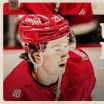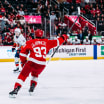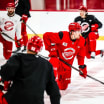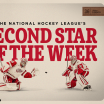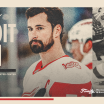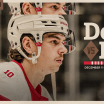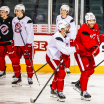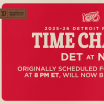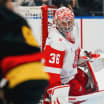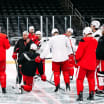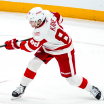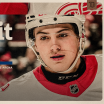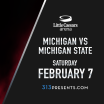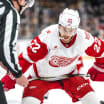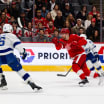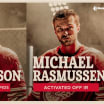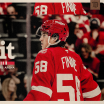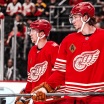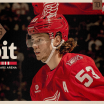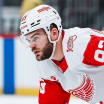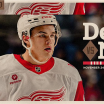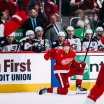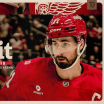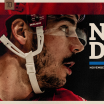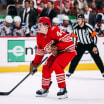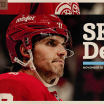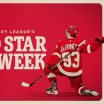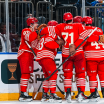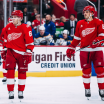On the Wings of Tomorrow
Pearson learning on and off the ice in Grand Rapids, McIsaac traded, Petruzzelli shines and more in the February prospect report
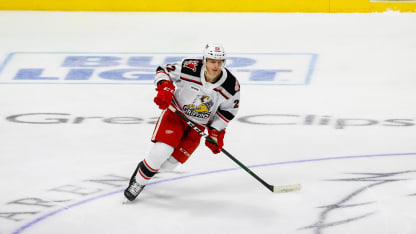
© Sam Iannamico/Grand Rapids Griffins
"I think that's definitely the biggest thing as far as adjustment," Pearson, 22, said of the learning curve during his first season as a pro. "Guys have more experience. They've been around longer than me.
"Our captain (Matt Ford) has been playing for a very long time. He's 35. He's got that experience, and guys on other teams have a similar amount of games played. They kind of know the ins and outs, and have been around the block. They know what works for them. "I think that's still something that I'm trying to figure out."
Whatever it takes. #GoGRG | @22CPearson pic.twitter.com/Xtmd49dFuW
— Grand Rapids Griffins (@griffinshockey) February 6, 2020
Away from the rink, center Pearson, selected 104th overall by the Red Wings in the 2015 NHL entry draft, is also continuing his lessons.
Though he left the NCAA ranks after three seasons with the Maine Black Bears to sign a contract with the Wings late last season, Pearson is still taking online courses through Maine, seeking to complete his degree in finance.
He began the school year just 15 credits shy of graduating.
"I wanted to get my degree," Pearson explained. "I was in college for three years. Obviously I went there for hockey but school was important to me, too.
"You give yourself as many tools as you can in life, and having a degree is something that I think can help you after the career is done. It was important for me to finish the finance degree."
Studious and responsible are qualities that Pearson also brings to the rink for the Griffins. He's been deployed predominantly this season in a role as a checking center and penalty killer. In his last season at Maine, the 6-foot-2, 200-pound Pearson was presented the Frank Jones Award as the best defensive forward by the New England Hockey Writers Association.
The same personality traits that make him a good student also make Pearson a good student of the game. He believes there's a bit of a correlation that carries over from his studies to his performance on the ice.
"I think to a certain extent but at some point, natural abilities take over," Pearson said. "Obviously you can learn, and watching the game helps. Putting yourself in situations in practice and even in games where you have to react faster, I think maybe it does tie in. It keeps your mind sharp away from the rink also.
"I don't how much it would necessarily help but it definitely can't hurt anything. If anything doesn't hurt you, and you think it could possibly have a benefit and give you a little extra edge over someone else, then why not do it?"
As with any newcomer to a job, there's an adjustment period. The first year in the professional ranks is a rollercoaster ride of emotional ups and downs. It can overwhelm players if they don't find other interests to occupy their minds, and instead focus 24-7 on their hockey fortunes.
Pearson finds that his schoolwork helps give him an outlet, an escape from the game. It keeps his outlook clear and fresh when he gets to Van Andel Arena and it's time to go to work.
"I think that keeps your mind off of it," Pearson said. "It also gives me interests outside of hockey. It's important to have that also. My whole life can't revolve around the game. Obviously it's my job now, and you're expected to bring a certain level of intensity and work ethic every time you get to the rink. However, when you do get home from the rink, you kind of want to decompress.
"Not that I decompress looking at numbers all the time but it's something that interests me. Every day, you learn something new in finance. I think that's something that keeps it the most interesting."
Time management is a vital skill for all pro athletes to master, and Pearson believes his university experience, combined with his continuing studies, help him to stay occupied during what can be ample free time.
"I think that it's helped me," Pearson said. "You have more time in pro. You practice in the morning and then after that, you're home. You really don't have much else the rest of the day. It's fun to have something to do with those hours.
"For me, I have classes, so I make sure that those are done. And when they're done, I have my own time to do what I want. College definitely helped me in that aspect. It gave me three years to figure that out, and I think that's kind of helped me here."
From a hockey standpoint, Pearson's been the benefactor of home schooling. His father Scott Pearson was a 1988 first-round draft pick of the Toronto Maple Leafs who played 292 NHL games between 1988-2000.
"He's also a great resource for me," Pearson said. "Aside from my teammates, it's him that I use a lot as well. He did go through it. He played 12 years of pro. That's something I was able to use and continue to use as I get older and play more games. He kind of told me what to expect.
"Obviously things have changed a little bit from when he played but the grind and the mental aspect of things, he's been really good with that."
Every day at the rink, class is also in session for Pearson as he picks up the nuances of the pro game.
"You play way more games in the pro ranks than I ever did in college," Pearson said. "That was another big adjustment for me. Those guys have obviously done it before, so they kind of know their body in a way that I'm still trying to figure out in my first year. It's an advantage in that aspect. Obviously I'm a little younger. Every game there's more experience and I'm figuring it out as I go.
"The older guys, they've seen a lot. They've been around for quite awhile, so they have seen stuff that I haven't seen yet, been through experiences, been on different teams and chemistries on the team. I bounce ideas off them, and just ask questions.
"It's very valuable personally."
SODERBLOM PROMOTION: Left-winger Elmer Soderblom (159th, 2019) spent the latter half of January playing for Tingsryds AIF in the Allvenskan, Sweden's second professional division.
He was loaned to them for five games by Frolunda and was held pointless.
The 6-foot-6, 220-pound Soderblom, 18, was leading the Swedish under-20 junior league in scoring for Frolunda HC when he was called up. In his absence, he dropped to third overall with 38 points. But his 1.71 points per game ratio is best in the league.
Soderblom's older brother Arvid, 20, is a goaltender for Tingsryds AIF.
Soderblom has also played 10 games this season for Frolunda HC in the SHL, Sweden's elite pro league, but is still looking for his first point.
ON THE MOVE: Defenseman Jared McIsaac (36th, 2018) found himself headed to a new home shortly after he returned from the Czech Republic, where he helped Canada win the world junior gold medal last month.
The Halifax Mooseheads traded McIsaac, 19, to the Moncton Wildcats at the QMJHL trade deadline.
1st goal as a @monctonwildcats for Jared McIsaac tonight vs @SJSeaDogs at the @AvenirCentre. Here’s the call by @GGreenMachine & @MrCDobson. #DefendTheDen pic.twitter.com/8mP8Pu5zFx
— Denis Leblanc (@DenisL_1981) January 18, 2020
Halifax won the QMJHL title last season and played in the Memorial Cup but this year are 17th overall in the 18-team league. Moncton sits third overall and position McIsaac with another opportunity for a long playoff run this spring.
PETRUZZELLI SHINES: Keith Petruzzelli (88th, 2017) started off the month of February by stopping just about everything.
The first weekend of the month saw the junior Quinnipiac Bobcats netminder post a 22-save, 5-0 shutout of No. 1 Cornell. Petruzzelli followed that up with a 30-save performance in a 2-1 victory over Colgate.
NO. 1 GOES DOWN!
— NCAA Ice Hockey (@NCAAIceHockey) February 1, 2020
Quinnipiac shuts out top-ranked Cornell, 5-0, behind a shutout from Keith Petruzzelli. pic.twitter.com/1cNJ89pZOL
Petruzzelli's two-game totals were an NCAA-best .981 save percentage, and a 0.50 goals-against average, good for a tie for second in college hockey.
The #NCAAHockey Men's Stars of the Week!
— NCAA Ice Hockey (@NCAAIceHockey) February 4, 2020
1 - Keith Petruzzelli, Quinnipiac
2 - Jonny Evans, UConn
3 - Austin McIlmurray, Sacred Heart pic.twitter.com/NDufe8B7sz
His efforts earned the 6-foot-5, 185-pound Petruzzelli plenty of recognition. He was named the NCAA First Star of the week, and the ECAC goaltender of the week. He previously won the latter award this season the week of Nov. 18.
Back-to-Back! Congrats to Keith Petruzzelli on earning his second straight #ECACHockey Goaltender of the Week honors! #BobcatNation
— Quinnipiac Men's Ice Hockey (@QU_MIH) February 10, 2020
READ ➡️ https://t.co/IiekhcmZt7 pic.twitter.com/9mXkOaTop8
BOSTON'S BEANPOT: Forwards Robert Mastrosimone (54th, 2019) and Ethan Phillips (97th, 2019) and defenseman Kasper Kotkansalo (71st, 2017) were all held off the scoresheet as the Boston University Terriers lost, 5-4, in double overtime to the Northeastern Huskies in the Beanpot Tournament final.
What a feed from Zegras to Robert Mastrosimone who puts BU up in the last minutes of regulation. BC answered back and the Beanpot semifinal is to be decided in OT. pic.twitter.com/bMSCYzVBSg
— Tri-State Hockey (@TriState_Hockey) February 4, 2020
Mastrosimone scored in Boston's 5-4 semifinal victory over Boston College.
The young forward also made a nice defensive play to prevent a Northeastern goal.
Robert Mastrosimone bats a sure-goal out of mid-air for the spectacular save! 🏒😱🙌 #JayAndDan
— JayOnSC (@JayOnSC) February 11, 2020
•••
(🎥: NESN) pic.twitter.com/UXbZvjhAtD


